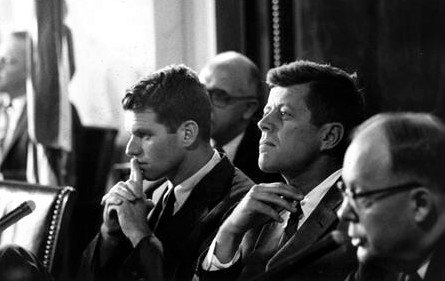
In October 1962, an American U-2 reconnaissance flight discovered Russian offensive missiles in Cuba, posing a direct threat to the United States.
In the film adaptation of Robert Kennedy’s Thirteen Days, about the Cuban missile crisis, the United States and Russia stood at the abyss of nuclear war.
After Russian sponsored Cuban missiles shot down a U.S. reconnaissance plane, President Kennedy wisely held off retaliating knowing that it could begin a chain reaction that would lead to nuclear war. Nonetheless, Kennedy was preparing for the inevitable. With time running out, one final negotiation took place between Attorney General Robert Kennedy and Russia’s Ambassador Anatoly Dobrynin. In his book, the attorney general carefully walks the Russian ambassador through the facts.
“The Soviet Union had secretly established missile bases in Cuba while at the same time proclaiming privately and publicly that this would never be done. … I was not giving them an ultimatum but a statement of fact. [Khrushchev] should understand that if they did not remove those bases, we would remove them.
“President Kennedy had great respect for the Ambassador’s country and the courage of its people. Perhaps his country might feel it necessary to take retaliatory actions; but before that was over,” the attorney general made clear, “there would be not only dead Americans but dead Russians as well.”
A peaceful solution between both countries was the only option to avoid nuclear conflict.
Kennedy offers to remove American missiles in Turkey in exchange for the removal of Russian missiles in Cuba. However, the Turkish missiles would be removed six months later to avoid the appearance of a quid pro quo, and, Robert Kennedy stressed, “We had to have a commitment by tomorrow…”
Before leaving Kennedy’s office, Dobrynin tells the young attorney general, “You’re a good man; your brother is a good man. I assure you there are other good men. Let us hope the will of good men is enough to counter the terrible strength of this thing that was put in motion.”
It’s unclear if those words were actually spoken by Dobrynin, but his purpose was clear: Russia and America had to step back, and calmly look for an alternative to war.
The crisis before us is no less critical, one that requires stepping back and calmly looking for an alternative to the bitterness and distrust which could easily lead to an escalation of the war in Congress.
The incoming Biden administration needs to meet with Republican leadership and peacefully find common ground ensuring that the people’s business can proceed without delay.
Shortly before November 3, Senate Majority Leader Mitch McConnell made assurances that there would be a peaceful transition of power if Biden won.
Yesterday, however, McConnell publicly said that “President Trump is 100 percent within his rights to look into allegations of irregularities and weigh his legal options.”
President-elect, Joe Biden is carefully avoiding any statement which could escalate tensions between the two parties. I believe that Biden and McConnell want to work together in good faith. He’s worked with Biden before.
“In late July 2011,” New York Times columnist Carl Hulse writes, “with an economy-shaking Treasury default only a few days away and Congress flailing, Senator Mitch McConnell received a Saturday phone call from Joseph R. Biden Jr., then the vice president.
“ ‘I think it’s time we talk,’ Mr. Biden told Mr. McConnell, Republican of Kentucky, who was then the minority leader.
“That opening, recounted by Mr. McConnell in his memoir, ‘The Long Game’ initiated the second in a series of one-on-one tax and budget negotiations that produced agreements that rescued the government from imminent fiscal disaster…”
“Yet as much as anyone across the aisle, Mr. Biden… has a close relationship with the Senate leader and a track record of working with him to strike bipartisan deals. The Kentuckian has described Mr. Biden not only as someone he liked, but also as a man of his word who understands how congressional negotiations work and who knows how to give as well as take.”
The election of Joe Biden presents a real opportunity for both sides to sit down and reconcile policy differences that stand in their way. Their first challenge and opportunity would be an effective bipartisan plan to defeat the coronavirus, along with a second financial aid package to help Americans through a crisis that has besieged us all.
However, there is a more serious threat in their way: President Donald Trump.
With 70 million votes, the President has so indoctrinated his supporters that they are willing to act on his command. While all the lawsuits in the world aren’t going to change the 2020 election, republicans in congress have become silent witnesses to Trump’s daily actions of retribution believing that he could turn those 70 million against them now or in the next election.
The only vaccine for the virus that is Donald Trump is moral courage. Do republicans have the courage to stand up to Trump and stand for the American people?
Dobrynin’s words raise the question: Can “the will of good men be enough to counter the terrible… thing that was put in motion”?
Are there any good men left in Washington whose will is persuasive enough to make a difference?
I wonder how Robert Kennedy would negotiate this one.
Comments










